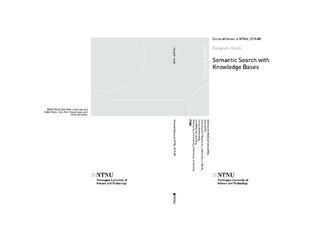| dc.description.abstract | Over the past decade, modern search engines have made significant progress towards better understanding searchers' intents and providing them with more focused answers, a paradigm that is called \semantic search." Semantic search is a broad area that encompasses a variety of tasks and has a core enabling data component, called the knowledge base. In this thesis, we utilize knowledge bases to address three tasks involved in semantic search: (i) query understanding, (ii) entity retrieval, and (iii) entity summarization.
Query understanding is the first step in virtually every semantic search system. We study the problem of identifying entity mentions in queries and linking them to the corresponding entries in a knowledge base. We formulate this as the task of entity linking in queries, propose refinements to evaluation measures, and publish a test collection for training and evaluation purposes. We further establish a baseline method for this task through a reproducibility study, and introduce different methods with the aim to strike a balance between efficiency and effectiveness.
Next, we turn to using the obtained annotations for answering the queries. Here, our focus is on the entity retrieval task: answering search queries by returning a ranked list of entities. We introduce a general feature-based model based on Markov Random Fields, and show improvements over existing baseline methods. We find that the largest gains are achieved for complex natural language queries.
Having generated an answer to the query (from the entity retrieval step), we move on to presentation aspects of the results. We introduce and address the novel problem of dynamic entity summarization for entity cards, by breaking it into two subtasks, fact ranking and summary generation. We perform an extensive evaluation of our method using crowdsourcing, and show that our supervised fact ranking method brings substantial improvements over the most comparable baselines.
In this thesis, we take the reproducibility of our research very seriously. Therefore, all resources developed within the course of this work are made publicly available. We further make two major software and resource contributions: (i) the Nordlys toolkit, which implements a range of methods for semantic search, and (ii) the extended DBpedia-Entity test collection. | nb_NO |
